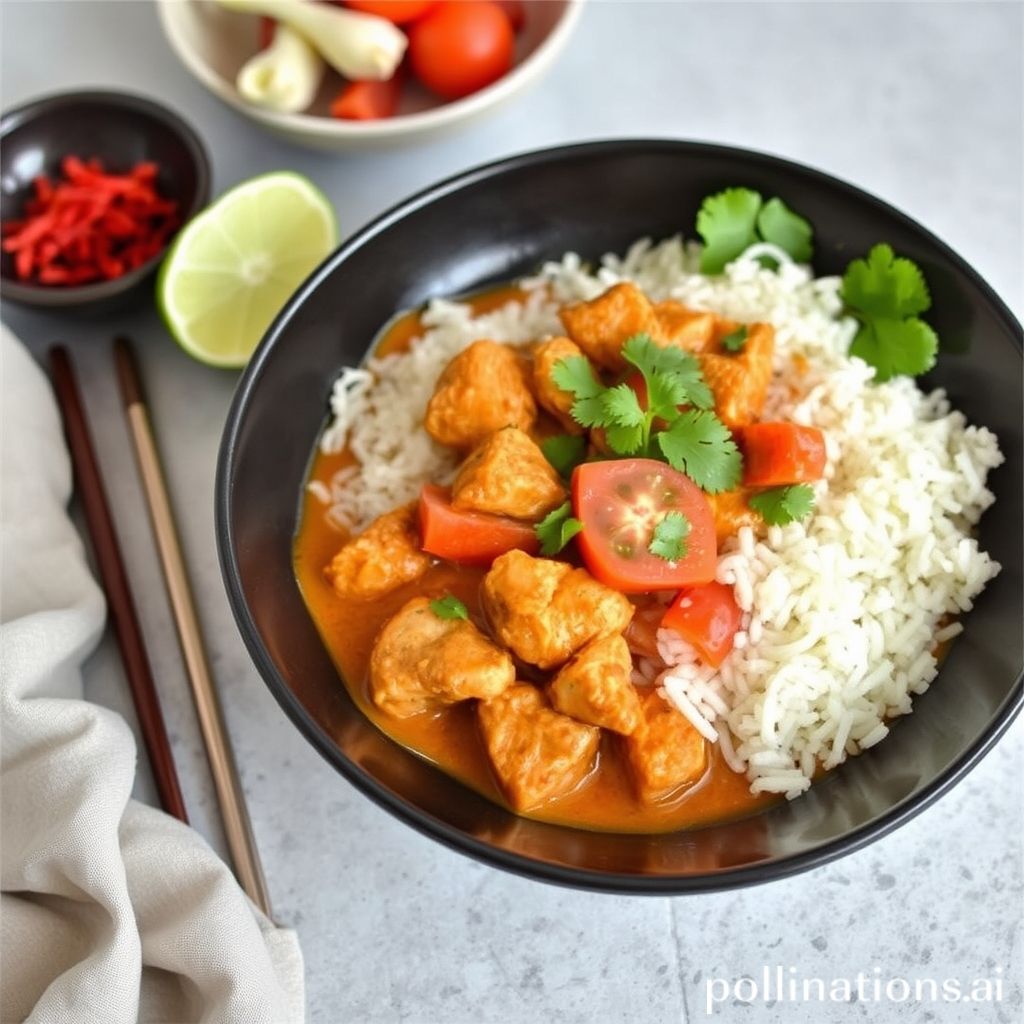Table of Contents
- Introduction
- Key Ingredients for Authentic Thai Red Curry Chicken
- Step-by-Step Cooking Instructions
- Common Variations and Additions
- Health Benefits and Nutritional Information
- Pairing Thai Red Curry Chicken with Side Dishes
- Tips for Perfecting Your Thai Red Curry Chicken
- History and Cultural Significance of Thai Red Curry
- Frequently Asked Questions (FAQs) about Thai Red Curry Chicken
- Conclusion
- Frequently Asked Questions
Introduction
Welcome to a tantalizing culinary adventure where East meets West! The heart of this journey beats in a single dish – Thai Red Curry Chicken – an exquisite symphony of flavors that promises to transport your taste buds to the bustling streets of Bangkok. Before we dive into the cooking process, let’s gather our ingredients.
Ingredients:
- 1 lb chicken breast, thinly sliced
- 2 tablespoons red curry paste
- 1 can (13.5 oz) coconut milk
- 1 cup chicken broth
- 1 tablespoon fish sauce
- 2 teaspoons sugar
- 2 cups mixed vegetables (bell peppers, carrots, snap peas)
- 1 tablespoon vegetable oil
- Fresh basil leaves for garnish
In this article, we will delve deep into the rich tapestry of Thai cuisine, uncovering the secrets behind its bold and intricate flavors. From the fragrant blend of spices in the red curry paste to the creamy coconut milk that binds it all together, each ingredient plays a pivotal role in creating a dish that is both comforting and exhilarating.
Prepare yourself for a flavorful sojourn that will leave you yearning for more. Can you already smell the aromatic curry wafting through your kitchen? Let’s get started!
Key Ingredients for Authentic Thai Red Curry Chicken
Thai Red Curry Chicken is a beloved dish that boasts a rich and aromatic flavor profile, thanks to its essential ingredients. At the heart of this dish is the red curry paste, made from a blend of red chili peppers, garlic, lemongrass, and various other spices. This paste provides the signature heat and depth of flavor.
Another must-have ingredient is coconut milk, which adds a creamy texture and balances the spiciness of the curry paste. The use of boneless chicken pieces ensures the meat is tender and absorbs the curry’s flavors.
Thai basil leaves introduce a subtle anise-like flavor, while kaffir lime leaves contribute a zesty aroma. Do not forget to include fish sauce for that umami kick, and a bit of palm sugar to balance the flavors.
Vegetables like bell peppers and bamboo shoots add both texture and color to the dish. Finally, a squeeze of lime juice just before serving brightens up the flavors and brings everything together.
These ingredients combined create a harmonious and delectable dish that is quintessentially Thai.
Step-by-Step Cooking Instructions
To make Thai Red Curry Chicken, start by heating a tablespoon of oil in a large frying pan over medium heat. Add two tablespoons of red curry paste and cook for about 2 minutes, stirring constantly to release the flavors.
Next, add 400ml of coconut milk, gradually blending it with the curry paste until you have a smooth sauce. Bring it to a gentle simmer, allowing the flavors to meld together.
Then, add 500g of bite-sized chicken pieces to the pan. Stir well to coat the chicken with the curry sauce. Cook for about 10-15 minutes, or until the chicken is fully cooked.
Add 200g of vegetables such as bell peppers, bamboo shoots, or green beans. Cook for an additional 5 minutes, or until the vegetables are tender yet crisp.
To finish, season with fish sauce and sugar to taste. Optionally, you can add a few kaffir lime leaves or a handful of fresh Thai basil leaves for an extra burst of flavor. Serve the curry hot over steamed jasmine rice, and garnish with chopped cilantro or lime wedges if desired.
Common Variations and Additions
Thai Red Curry Chicken is a versatile dish that welcomes a myriad of variations and additions. One common variation is the inclusion of different proteins such as shrimp, tofu, or beef instead of chicken. Each protein brings its own unique flavor and texture to the dish, providing an exciting twist to the traditional recipe.
Another popular addition is an assortment of vegetables. While bell peppers and bamboo shoots are classic choices, you can also add eggplants, zucchini, or snow peas to enhance the dish with extra nutrients and colors. Some cooks like to include pineapples for a touch of sweetness, which perfectly complements the creamy and spicy curry sauce.
Coconut milk is a staple in Thai Red Curry, but for a lighter version, some prefer using light coconut milk or even broth to reduce the calorie content without sacrificing too much of the rich flavor.
The level of spiciness can also be adjusted to suit individual preferences. Adding more red curry paste will increase the heat, while incorporating more coconut milk can mellow it down.
Fresh herbs such as Thai basil or cilantro can be sprinkled on top for added aroma and freshness. Lime leaves and lemongrass are also excellent additions that bring zesty notes to the dish.
Health Benefits and Nutritional Information
Thai Red Curry Chicken is not only a delicious dish but also offers several health benefits. The main ingredients often include chicken, red curry paste, coconut milk, and a variety of vegetables such as bell peppers and zucchini. These ingredients bring in a rich nutritional profile.
Chicken is a great source of lean protein, which is essential for muscle repair and growth. Coconut milk, while higher in fat, contains medium-chain triglycerides (MCTs) that are easier to digest and can be a quick source of energy.
The red curry paste, a mix of red chilies, garlic, lemongrass, and other spices, is packed with vitamins and antioxidants. Capsaicin from the chilies has been linked to boosting metabolism and reducing inflammation. The accompanying vegetables add fiber, vitamins, and minerals that contribute to overall health.
Additionally, the herbs like basil and cilantro found in Thai Red Curry Chicken are rich in antioxidants and can aid in digestion. Altogether, while being indulgent, Thai Red Curry Chicken offers a balanced meal that can fit into a healthy diet when consumed in moderation.
Pairing Thai Red Curry Chicken with Side Dishes
Pairing Thai Red Curry Chicken with the right side dishes can elevate your meal to new heights. One classic option is steamed jasmine rice, which perfectly absorbs the rich, spicy flavors of the curry. For a healthier alternative, consider brown rice or quinoa.
Another great side dish is a fresh green papaya salad. The crunchy texture and tangy dressing provide a refreshing contrast to the creamy curry. Additionally, a side of stir-fried vegetables, such as bok choy, bell peppers, and snap peas, can add both color and nutritional value to your meal.
If you prefer a more substantial accompaniment, consider serving Thai Red Curry Chicken with a side of garlic naan or roti. These breads are excellent for soaking up the curry sauce. Finally, don’t forget to include some Thai-inspired appetizers like spring rolls or satay skewers to complete your dining experience.
Tips for Perfecting Your Thai Red Curry Chicken
Perfecting your Thai Red Curry Chicken involves a few essential tips that can elevate the dish from good to extraordinary. First, always use fresh ingredients whenever possible. Fresh lemongrass, kaffir lime leaves, and Thai basil bring authentic flavors that dried spices just can’t match. Secondly, invest time in making a homemade red curry paste, as it often has a deeper, more complex flavor profile compared to store-bought versions.
Another key is to be mindful of the coconut milk. Use full-fat coconut milk for a richer and creamier sauce. If you find the sauce too thick, you can dilute it slightly with a bit of chicken broth. Balance is crucial when it comes to Thai cuisine; aim to achieve a harmonious blend of spicy, sweet, salty, and sour. Taste the curry as you cook and adjust the seasoning accordingly with fish sauce, sugar, and lime juice.
Also, don’t rush the cooking process. Allow the chicken to simmer in the sauce to absorb all the flavors fully. Finally, garnish the dish with fresh herbs and a squeeze of lime just before serving to add a burst of freshness.
History and Cultural Significance of Thai Red Curry
Thai Red Curry Chicken, known as ‘Gaeng Phet’ in Thai, is a quintessential dish that has its roots deeply embedded in the culinary traditions of Thailand. This flavorful dish is characterized by its rich, creamy consistency and vibrant red color, derived from red chili peppers. The history of Thai Red Curry can be traced back to the early days of Thai civilization, influenced by Indian and Chinese cuisines that introduced various spices and cooking methods.
The preparation of Thai Red Curry typically involves blending red chili peppers with aromatic herbs and spices such as lemongrass, galangal, and kaffir lime leaves to create a paste. This curry paste is then cooked with coconut milk, enhancing its rich flavor and creamy texture. Historically, the dish was a symbol of prosperity and festivity, often served during important occasions and family gatherings.
Culturally, Thai Red Curry represents the harmonious blend of bold flavors and vibrant colors inherent in Thai cuisine. It reflects the Thai way of balancing the five fundamental tastes: sweet, salty, sour, bitter, and spicy. Today, Thai Red Curry Chicken is not just a staple in Thai households but also a beloved dish worldwide, cherished for its tantalizing taste and cultural richness.
Frequently Asked Questions (FAQs) about Thai Red Curry Chicken
Thai Red Curry Chicken is a popular dish that combines succulent chicken pieces with a rich, aromatic curry sauce. The sauce’s vibrant red color comes from red curry paste, which is made from red chili peppers, garlic, lemongrass, and various spices. Coconut milk is then added to give it a creamy texture and balance the heat of the chili.
This dish is often accompanied by vegetables like bell peppers, bamboo shoots, and Thai basil, which add layers of flavor and nutrition. The choice of protein isn’t limited to chicken; shrimp, tofu, and beef are also commonly used. Typically, Thai Red Curry Chicken is served over steamed jasmine rice to soak up the delicious sauce, making it a complete and satisfying meal.
Cooking Thai Red Curry Chicken requires a balance of flavors, focusing on sweet, spicy, salty, and sour elements. Key ingredients include fish sauce, sugar, and lime juice. It is a versatile dish that can be adjusted to fit different spice levels and dietary preferences. Overall, it is a flavorful and comforting dish that exemplifies the harmonious blend of ingredients typical of Thai cuisine.
Conclusion
Embarking on the culinary journey of Thai Red Curry Chicken unveils a world of exotic flavors, vibrant colors, and rich traditions. With its diverse ingredients, step-by-step cooking instructions, and numerous variations, this dish stands as a testament to the intricacies and delights of Thai cuisine. Whether you’re a novice or a seasoned cook, the tips provided will help you perfect your Thai Red Curry Chicken, ensuring a harmonious balance of flavors in every bite.
Pair your curry with complementary side dishes like jasmine rice or green papaya salad to create a well-rounded meal that pleases both the palate and the eyes. The historical and cultural significance of this dish further enriches its appeal, making it more than just a meal but an experience.
If you’re inspired by the creativity and complexity of Thai Red Curry Chicken, why not expand your culinary repertoire? Dive into the world of chicken recipes with The Chicken Bible: Say Goodbye to Boring Chicken with 500 Recipes for Easy Dinners, Braises, Wings, Stir-Fries, and So Much More. This comprehensive guide will ensure your chicken dishes are anything but ordinary. Elevate your cooking today and say goodbye to boring meals forever!








